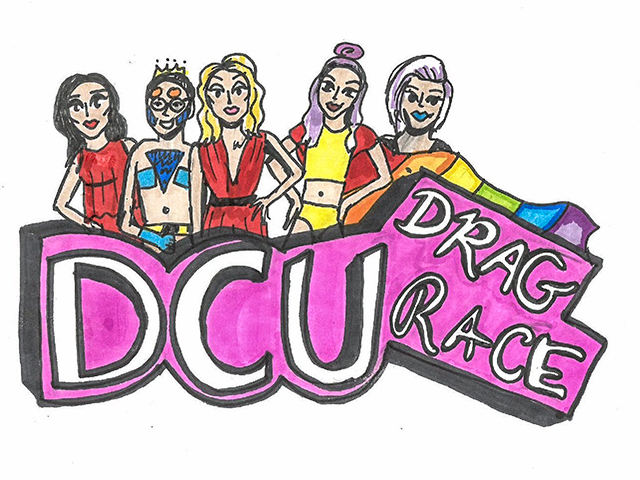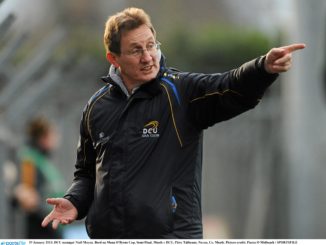
Sacrifices on a physical, mental and academic level are being made across all codes of third-level Gaelic games, according to some of DCU’s GAA players and coaches. In the build-up to the climax of the higher education GAA season, The College View has spoken to a number of DCU students who play on numerous teams and the impact this is having on their development.
The sage on this issue, however, is Prof. Niall Moyna of the School of Health and Human Performance and manager of the Sigerson side. He told this newspaper that a primary issue for the DCU senior team is that most of his players are also trying to break into their respective county squads:
“Because they’re trying to impress the inter-county manager, they’re putting an enormous amount of time and effort in.
“If you’re not getting the appropriate recovery, you might as well be doing no training because you’re getting no benefit from anyone’s training because your body is always in what we call a catabolic state; you’re always breaking down tissue. You’re never in a state where you’re getting the benefit of your training.”
The problem is intensified by the fact that the county sides are gearing up for the season ahead concurrently to DCU spending a number of weeks preparing for the home stretch of a championship.
“What you get is interference, a physiological term. So you’re not getting the strength benefit from the strength training and you’re not getting the endurance benefit from the endurance training because one is interfering with the other,” says Moyna.
Conor McGraynor, one of Moyna’s leading lights in the Sigerson this year, echoes the sentiment but feels that this scientifically nonsensical training pattern is necessary for any young footballer with ambition:
“I was burnt out a few years ago from being pulled in different directions, between fresher’s football, under-21 and county senior but that’s more down to the player themselves trying to make the senior panel.
“At county level they don’t realise how much you’re doing in college and how much your college work can be a stress on you. They’re just looking at their own picture of football.”
Although it may seem like managers hold all the cards when it comes to a young player’s development, one of DCU’s senior hurlers has made the decision to prioritise training at home over sessions in Glasnevin. Rob Lennon captained Bennettsbridge to an All-Ireland Junior Hurling Club title recently but had to miss the entirety of DCU’s league campaign due to commitments at home and was absent for the final match of the Fitzgibbon campaign.
“It’s hard. It’s non-stop. It’s week in, week out. If you’re continuing to be successful, you might get the guts of two weeks of a break over a six month period” he says.
“We’re out of Fitz now, but it’s difficult because you want to play as many of these competitive matches. Like, Fitzgibbon is probably the highest level aside from inter-county hurling and you just want to be trying to play as many of these matches against top players.”
Niall Moyna is also very concerned about the amount of strength and conditioning work done by players on a weekly basis but says that, in the last 10 years, his DCU senior side have done just four physical sessions. With all ball-work, Moyna reckons that the players gain a huge amount of enjoyment from training.
“The feedback we get from the players is that it’s a joy. Why is it a joy? It’s football. They’re not running around pitches bored out of their minds, you know, doing the same drills over and over. It’s a very games-based approach.”
Unfortunately, the same can’t be said for all players. Cormac Ryan is another senior hurler who has had many commitments away from DCU. At the height of his pre-season schedule last January, the Whitehall Colmcille man had up to 15 training sessions per week as well as balancing study for DCU’s exams which are held in the same month.
“There’s a sense of enjoyment that’s gone out of it at the top level. If you look at Fitzgibbon, Sigerson, senior inter-county, under-21 inter-county, the days of really enjoying every night that you’re going out are gone” says Ryan.
“The stuff that’s being demanded of young lads has gone too far, like, and they wonder why young lads are coming out with, kinda, nearly having these small breakdowns due to mental stress and pressure, like, it’s insane.”
One DCU GAA player who has seen the harrowing mental side to burnout resulting from sport is Sarah Rowe, a footballer with the university and Mayo Ladies as well as playing soccer with Raheny United. Rowe was also a fixture of the Ireland side that made it to the semi-finals of the Women’s European Under-19 Championship last summer. Rowe revealed to The College View that two of her close friends from that panel have not returned to the fold:
“They can’t seem to refocus themselves on going back training and going doing that routine again” says Rowe.
“Since then, for the last three or four months, one of them in particular now has been suffering from depression. She’s obviously getting help and stuff but doesn’t know when she wants to come back or if she wants to come back.”
While such experiences undoubtedly have an impact on any young player, Rowe is still competing at a high level between two sports. The lack of sympathy from either sport is evident, though:
“When it comes to soccer and Gaelic, managers aren’t really that understanding and neither of them are actually that aware of what you’re doing” she explains.
“Tonight, I’m training with DCU and then I’m going straight over to Parnell’s to train with Raheny after for two hours so that’s two training sessions a night which is done maybe three times a week.”
The evidence, on both an anecdotal and statistical level, suggests that the level of physical and mental stress being put on young GAA players in college is enormous. However, fresher football coach, Ross Munnelly, and DCU GAA Academy Director, Michael Kennedy, both declined to comment on the issue. Cormac Ryan believes that change is a long way away, though:
“Is anything going to change? I’d love to say it will. Realistically, it’s not going to because of this professional culture that’s not even crept into the GAA at this stage, but is the GAA at this stage is never going to leave.
“You can’t put this sort of pressure on a young lad and expect them to be able to cope with it completely. Their body or their mind or something is going to give in, or their performance or their exams. Something’s gonna give.”
Eoin Sheahan
Image Credit: Sportsfile




Leave a Reply